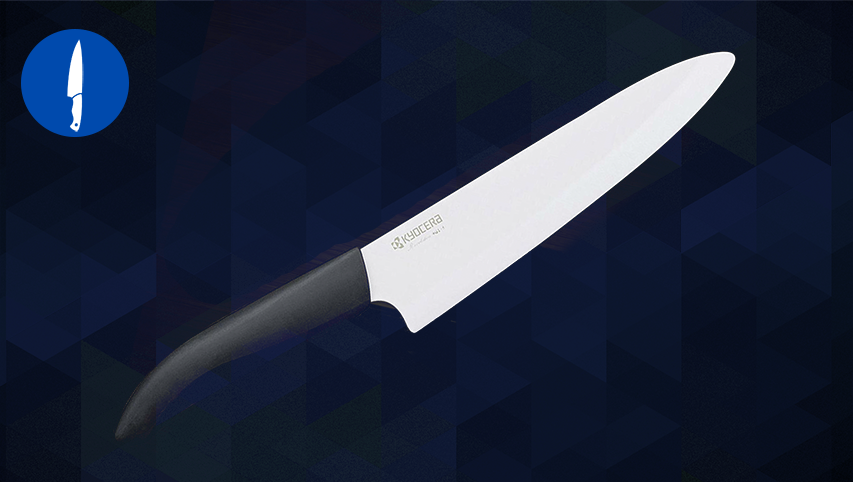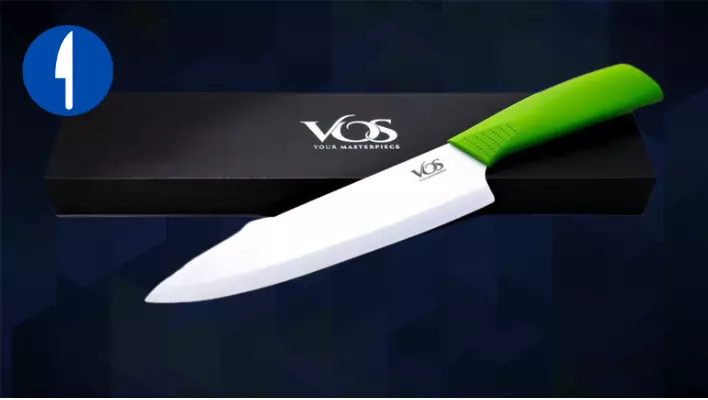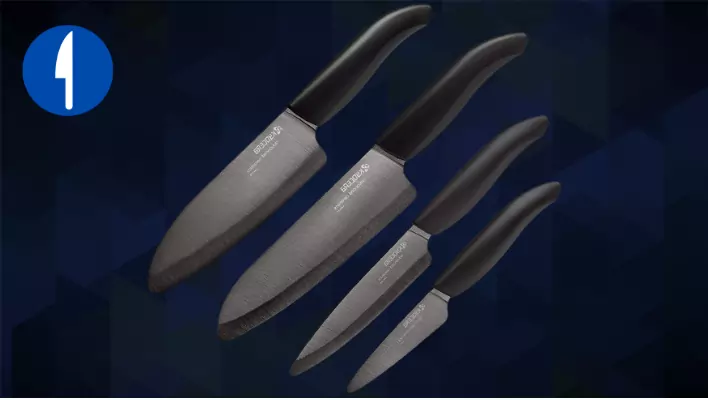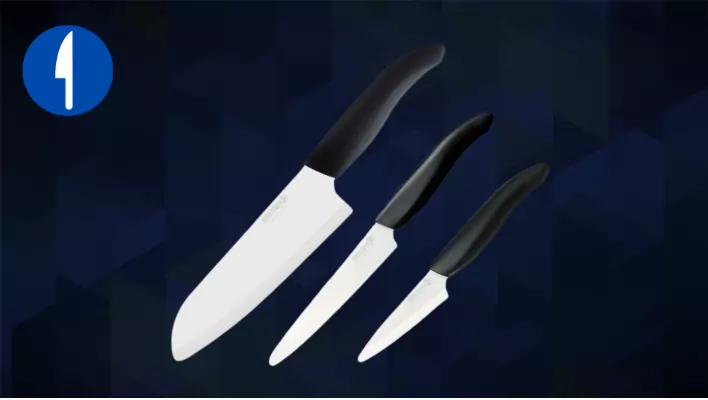Everything in this world has an alternative, and so do the steel kitchen knives. You can replace your steel knives with ceramic knives if you want. Although these knives do not have very good edge retention or a very solid blade, they still provide more than enough properties for starters and beginner chefs. As you all know, the best steel knives aren’t inexpensive and you have to invest a hefty amount to get one. This is not the case if you opt for ceramic knives.
Ceramic knives do not contain any steel in their composition as they are made up of zirconia. This compound material is more durable than porcelain and even a few metals. The wear and tear are just normal that do not make any issue as such. This is why ceramic knives are now getting popular among chefs.
Compared to cheap kitchen knives, these knives feature impressive sharpness that stays for a long time. You don’t need to sharpen these knives often as it was a common myth among many chefs. A single session would be enough for up to two weeks. But, if you have loads of work to do, you might need to sharpen it earlier.
Along with these things, many other things make you get one for yourself. Let’s get to know about these things in detail if you have got an idea of what a ceramic knife is!
What ceramic knives are good at?
Well, there are a lot of things that ceramic knives have an advantage at. Like:
1. Impressive and Economical Durability

Yes, that’s true! Ceramic knives are durable as they are made up of zirconium oxide which has a harder and a bit stronger composition than porcelain and some non-ferrous metals and even carbon steel. Although it is not quite versatile like other traditional Japanese knives, it still does the job considering its purpose to be used in a beginner’s hands. So, there’s no competition in this department.
Now, this is not a steel knife and we all know steel is a heavy metal that has a specific weight of around 8.0 g/cm3 but Ceramic’s specific weight is just 1.75g/cm3. So, it is quite lightweight than a steel knife and it becomes easy to handle in this regard. Remember, we aren’t talking about its maneuverability but handling only.
Some chefs would love lightweight knives while some prefer bulky knives. So, it is all about choices and taste. If you feel you want a lightweight knife, you can opt for ceramic knives. Otherwise, better go with the steel knives. The edge retention is not up to the mark but some of the best ceramic knives stand out pretty impressively at a twist check.
2. Sharpness & Maneuverability

Ceramic knives feature a good sharpness although they may seem like just plastic blades without any ability to cut. But, the sharpness here is indeed exceptional. Having a Tomato test would do the best for you to assume its performance. If its blade cuts the skin of a tomato flawlessly, it is pretty sharp and otherwise, it isn’t. And, this is fantastic here in the Ceramic knives case.
Now, why does it cut amazingly? Because it is made up of ceramic knives and ceramic is some of the hardest materials on earth. It also doesn’t interchange the taste and spice with the other ingredients. For example, if you pick a cheap knife to cut chilly and then an apple, it will share the spice with the apple even if you wipe it before. Also, it stays sharp for a good time which is similar to a Steel knife in many cases.
3. Variety & Pricing of Ceramic Knives

Ceramic knives are now produced in almost all types of kitchen knives that are used in the kitchen in preparing a meal. You can get it in a complete set, in Chef’s design, Santoku shape, and even in vegetable cleavers. Depending on your requirements, you can pick the right one. The above ones are common blades. Also, they are economical and comparatively inexpensive than a knife or steel blade.
4. Anti Rust Blade

This is another great thing about any ceramic knife. If you get a ceramic knife you don’t need to worry if it rusts or not. The blade is entirely made up of ceramic material so it won’t be a problem. Not only are these knives rust-resistant, but they are also anti-stain. Most ceramic knives are color-coated to protect their blades from catching any stains. Although they are anti-stain, you still have to wash them.
Again, you should not wash it inside a dishwasher because it is not a safe practice. It is a hard material so you are likely to damage your dishes and even the dishwasher. You should only wash these knives through your hands. Unlike steel knives, you don’t need to keep them dry because no metal means no issue in this case.
Top Brands for Ceramic Knives
What ceramic knives are bad at?
Everything on this planet has advantages and disadvantages, and so do ceramic knives. As we have already discussed the best things about a ceramic knife, let’s move to the bad things as well. But, the advantages are still more than their disadvantages. However, you should still take a look at it to get a clear picture in both ways.
- Hard But Brittle
Although Ceramic itself is durable and hard enough to compose an amazing knife, its hardness sometimes leads to brittleness. It means, that if you miss manage it or it accidentally falls from a specific height, you will sadly lose your blade right there or later. Now, you can call it fragile or whatever you love to, ceramic knives are hard and they are still breakable no matter how well you treat them.
- Not a Universal Knife
Ceramic knives are not meant to cut everything that you have out there on the countertop. These knives work best for veggies and fruits only. They won’t be good at mincing or butchering and never expect them to work on frozen things. Otherwise, these knives will chip and it may ruin the entire blade. On a side note, chipping is the major concern with ceramic knives, so you know how to use them!
- Resharpening isn’t so easy
Although these knives stand out in a razor-sharp blade and have a long-lasting sharpness. But, this sharpness is not everlasting and you will eventually need to resharpen it. You, being a beginner chef, may not be able to sharpen it well, so you need a professional sharpening service for that. However, some brands provide this service as well so you don’t need to worry as such for this thing.
If a ceramic knife becomes dirty, dissolve it in water and soak it in baking soda to turn it back to its original condition. Sharpening a ceramic knife on a ceramic grindstone will break the knife or a grindstone of the same hardness.